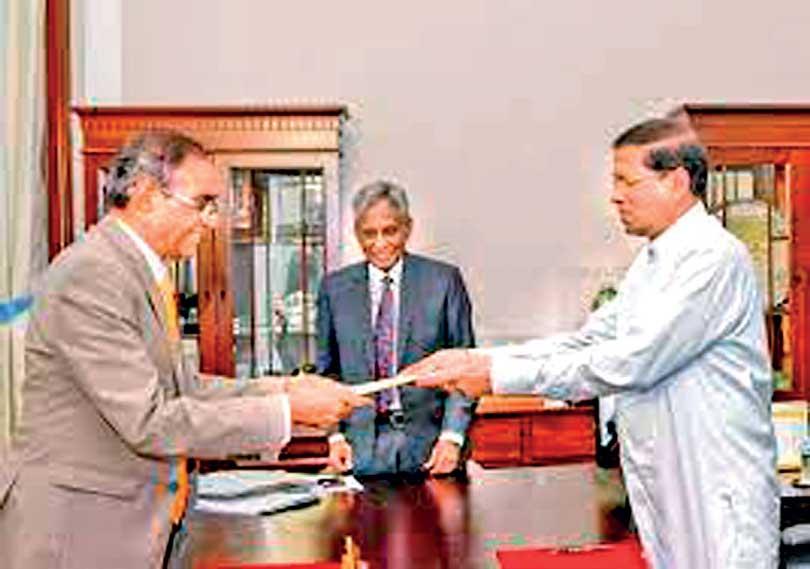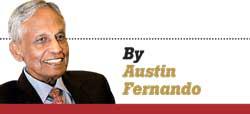Reply To:
Name - Reply Comment

K.C. Logeswaran handing over a copy to former President Maithripala Sirisena
 “I faced it all” is the autobiography of KC Logeswaran (Logesh to us), one of the most senior and prominent public servants, a famous district administrator, who faced the travails of terror, subtle operator privatizing the telecom industry, Secretary-Ministry of Telecom/ Media, Secretary-Police Commission and Ambassador in South Korea, Governor-West and Wayamba Provinces. He enjoyed associating with people of all nationalities and religions as a good Hindu.
“I faced it all” is the autobiography of KC Logeswaran (Logesh to us), one of the most senior and prominent public servants, a famous district administrator, who faced the travails of terror, subtle operator privatizing the telecom industry, Secretary-Ministry of Telecom/ Media, Secretary-Police Commission and Ambassador in South Korea, Governor-West and Wayamba Provinces. He enjoyed associating with people of all nationalities and religions as a good Hindu.
The book describes all these, and more.
He had completed writing it in 2014 and added the Governor’s experiences subsequently. Though he was a moderate person, he thought his writing was blunt. He appreciates Dhammika Amarasinghe for saving him from the pitfalls of being aggressive following the latter’s advice.
The title of the book is from Frank Sinatra’s ‘I did it my way.’ I faced it all covers history, experiences, persons, events, institutions, etc. The book (960 pages) is the story of Logesh the public servant, with occasional familial interactions. His memory expands even to minor episodes e.g., bribing a clerk with a meal to get his arrears or the transfer of a hapless colt, and how a ‘lottery’ was conducted to select Governors for transfers.
Logesh commences his career as a teacher in Gampola and later joins as a Divisional Revenue Officer. It was his parental preference too. The administrative evolution is touched by Logesh in a synopsis while discussing the DROs service (pages 11-13). He does so also about posts/telecommunication (Pg. 487), Police (Pgs. 646-649), Vavuniya District Development (Pgs. 18-24).
The proof of the pudding is in the eating, hence read Logesh’s book, you will not regret it, and you will meet the tall man!
 His achievements are many in diverse fields but when sharing experiences he highlights certain postings with glee, e.g. district administration, Telecommunication Ministry, Police Commission, Governor, etc. Nevertheless, in all writings, there is abroad underlying spectrum of public service. Always he dissects history, tradition, gains and losses, issues of co-existence, influences, political and bureaucratic messes-up, etc.
His achievements are many in diverse fields but when sharing experiences he highlights certain postings with glee, e.g. district administration, Telecommunication Ministry, Police Commission, Governor, etc. Nevertheless, in all writings, there is abroad underlying spectrum of public service. Always he dissects history, tradition, gains and losses, issues of co-existence, influences, political and bureaucratic messes-up, etc.
The career from1960 to 1975is the foundation to prove that a generalist, given the opportunities and incentives could reach greater heights and make a meaningful contribution to others’ lives. His experiences, activities, and achievements are described with names, offices, events, places, legal references, etc. They project the understanding of serving he had learned from seniors who taught many a lesson (eg. Neville Jayaweera, PH Premawardhane, Lal Wijepala. D. Nesiah), colleagues (Lionel Fernando, Neville Piyadigama. K Shanmugalingam, N. Pathmanadan, Faiz Mohideen),politicians (President Sirisena, Prime Minister Wickremesinghe, Minister P.P. Devaraj, Parliamentarian, C. Sunderalingam et al.) and even acknowledges the contribution of his subordinates Prema, Mangala, and Thevy. He remembers officers who worked with him everywhere, and he has a story to tell on most of them. This is one reason for the book being voluminous.
The experiences he has simply unraveled in dealing with serious issues (e.g. agriculture or planning, privatization, procurements, provincial administration, etc.)are appropriate lessons to many public officers, who lack his aptitude, though they are amply blessed with high technology/ information systems. Logesh proves that a developed personality, communication skills, serious study, and especially bosses’ influence build strength to counter trepidation and anxiety in public officers.
Reading him, on the whole, can reinforce incumbent public officials, guide them in the future. I may pick three important arenas from his book.
First is the State-Owned Enterprises (SOEs). There was a demand for restructuring them. Logesh speaks much from pages 486-574 about his experiences in the telecom industry, especially working with an affable minister to whom Logesh has dedicated his book in recognition of his foresight. He had to operate with the Minister’s private staff, policymakers, foreign stakeholders, expert staff, procurement managers ,et al. He states that no undue influence was made by the honest Minister on procurements during his 5-year tenure as Secretary. This ought to make the incumbent Secretaries, inundated with pressures in dealing with sugar, garlic, land, and other procurements, jealous of Logesh! Treasury officials currently battling with SOEs must read these pages, to learn how Logesh responded to SOEs’ issues.
The second area is on the National Police Commission. It should not be missed, by policemen, police administrators, and politicians from President downwards. His focus on leadership of the Police Commission to make it independent, and refers especially to Chairman Ranjith Abesuriya and Neville Piyadigama. Concurrently, he signifies mixed experiences on the Udalagama Commission, and the conflicting status of the Bhagawathi Committee, which finally collapsed to the dismay of foreign commentators.
His story is a case of honesty, dedication, hard work, enthusiasm, and fearless perseverance. These reflect throughout the book
The third is his writings on devolution in two chapters with experiences as Governor of Western and Wayamba Provinces. The complexities in management, legal issues, conflicts with the center and even among bureaucrats, political approaches and subtle operational tactics, coordinating problems with the district administration, political undercurrents, etc. open one’s mind to new vistas. Humor is shared by Logesh on the posting of Governors by lottery, but the subtle message was on political manipulation.
Logesh’s autobiography though focused on his public service career encompasses history, nature, administration in a broader manner. It shares how political and administrative conflicts were solved with mutual consent, political infighting, mistakes made, and how superior directions worked at all levels. My advice to all new Governors is they should at least read the two chapters‘ The Gubernatorial Garb’ and ‘Hasthishilapura’. It is because we hear of Governors assuming they are the Provincial Mini-Presidents, or ‘Pocket editions of the President,’which is not, and reading Logesh might put them into the proper gauge.
As for the secrets of Logesh’s success, the autobiography shows his commitment, managing the strengths, understanding weaknesses in him as well as others, constructively handling the opportunities, and facing threats sans fear. His story is a case of honesty, dedication, hard work, enthusiasm, and fearless perseverance. These reflect throughout the book.
He has been appreciative of his bosses like Neville Jayaweera, PH Premawardhane, et al. who showed the path for success. Most experiences, especially while in district administration are lessons to juniors and officers like District Secretaries. He has appreciated and expressed gratitude for their assistance.
All chapters give vivid descriptions of bureaucrats of differing levels, politicians of different calibers, and hues. One good example is the chapter identified as Steeplechase. The experiences he has gained as the Assistant Director of Planning, the operations of District Development Councils, development planning, involvements of the Political Authorities, the peculiarities of politicians are given in detail.
Logesh has not shied away from describing the difficulties, anxieties, griefs, and challenges he has faced. Young readers of this book will learn that there will be disappointments in life, but hard-won achievements will compensate for all that. The book may remind us with apologies to Henry Wadsworth Longfellow that Logesh’s footprints are left on the sands of time, for us to follow and enjoy.
Though Logesh has titled the book ‘I faced it all,’ it is more. It fits into Frank Sinatra’s song ‘I did it my way.’The 960 pages showcase his official life. It covers his travels in the north-south-west and foreign lands. His story shows a few regrets, but chartering a planned course and showing the readers how to take a careful step each time. He knew how much to chew, and when to chew. He was hail and hearty, and we knew it as a friend, colleague, Governor, and even as a retiree. Logesh shows humility expecting his children to finish the line by adding “and stood tall’. They need not bother, Logesh has very explicitly done so by being so. The proof of the pudding is in the eating, hence read Logesh’s book, you will not regret it, and you will meet the tall man!.